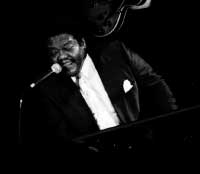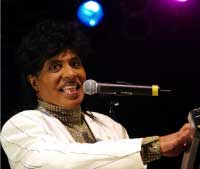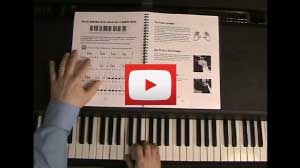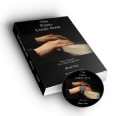Early Rock Pianists
Johnnie Johnson, Fats Domino, Little Richard, Huey "Piano" Smith, Jerry Lee Lewis
Early rock pianists drew their inspiration from the boogie woogie and jump blues pianists that came before them. These early rock and roll piano pioneers grew up during the years of America's boogie woogie craze, from the late 1930's to the early 1950's.
These early rock pianists took the sound of boogie woogie and gave it a heavy dose of attitude. The tempo and intensity increased, and the music became blues that didn't feel blue.
Early rock and roll was music for teenagers. Boogie woogie was music for rent parties and bars. Rock and roll was for sock hops at high school gyms.
As a side note: Ray Charles, another important early rock pianist, is profiled with the jump blues pianists.
Johnnie Johnson, 1924-2005
John Clyde Johnson was born in Fairmount, West Virginia, and began playing piano at age 4. He joined the service during WWII and played in Bobby Troup's All-Star Service band called the Barracudas.
After the war Johnnie moved to Chicago and played with local blues greats including Muddy Waters and Little Walter. He moved to St. Louis in 1952 and started a jazz and jump blues band. On New Year's Eve the band was hired to perform, but their singer couldn't make the gig. A local singer-guitarist, Chuck Berry, was hired at the last minute to substitute. Chuck new all the tunes, and the audience loved him. He was hired permanently.
Johnnie got the band an audition with Chess Records in Chicago. Chess wanted to sign Chuck as a solo artist, so Johnnie's band folded, and in effect, Chuck Berry hired Johnnie. The two played together for 20 years, and Johnnie played a big role in shaping the Chuck Berry rock and roll sound.
Johnnie appeared in the Chuck Berry movie Hail! Hail! and toured with Greatful Dead guitarist Bob Weir in 1996 and 1997. Johnnie Johnson was inducted into the Rock and Roll Hall of Fame in 2001. Every summer his hometown of Fairmount, W.V. hosts the Johnnie Johnson Blues Festival in tribute to this "father of rock and roll," and early rock pianist.
Antoine "Fats" Domino, 1929-

Antoine Domino was one of nine siblings growing up in New Orleans. Though his father played violin and his uncle played in Kid Ory's band, he was the only child in the family that took to music. The family was given a piano when he was 6, and he began playing it right away. By the time he was 10, he was playing for pennies at local honky-tonks.
In his early teens he needed to make more than pennies to help support his family, and he took a job at a bed spring factory. Popular local band leader Dave Bartholomew asked Fats to join his band at a roadhouse gig, so Fats worked both jobs for a while. One day a stack of bed springs fell on him, injuring his hands badly. The doctors said he would never play piano again. But within two years, he was back in Bartholomew's band at the roadhouse.
Dave Bartholomew's arrangements and Fats' singing and playing were becoming a New Orleans sensation. Imperial Records heard them at the roadhouse, and signed them on the spot. Their first record, "The Fat Man," was sold as a Fats Domino record, and went on to sell more than a million copies in the blues market. In fact, Fats was considered a bluesman, but with the warm good humor of New Orleans.
That changed in 1955 with the release of "Ain't That A Shame," which broke into the new white rock and roll market. Fats became a superstar, and followed with "I'm In Love Again" and "Blueberry Hill." In 1956, he went on tour with the packaged rock and roll tours featuring many artists, and appeared in two rock and roll movies; Shake, Rattle and Rock and The Girl Can't Help It.
Fats went on to become the most successful of the early rock pianists, charting with 37 top 40 singles, including "Blueberry Hill" which was #2 on the pop charts, and #1 on the R&B charts for 11 weeks. He released more than 60 singles on Imperial, and had a steady string of hits until 1961. Later in 1968 he charted again with a cover of the Beatles' "Lady Madonna."
Fats Domino still resides in the house he bought in New Orleans in 1958, where he raised his 8 children.
"Little" Richard Penniman, 1932-

"Little" Richard Penniman was born and raised in Macon, Georgia. His father was a bootlegger, but he also led his family gospel singing group, The Penniman Singers. This duality of doing the Lord's Work and the "devil's" work would shape his life and career.
Little Richard learned to play the "devil's" music, boogie woogie, at a young age. He was signed to RCA Victor at the young age of 19, and then Peacock, where this early rock pianist had a regional hit with "Little Richard's Boogie." In 1954 he went with the Specialty Records label, and recorded a string of rock and roll classics, produced by Robert Blackwell at Cosimo Matassa's New Orleans studio. This is the same studio that recorded Fats Domino, Professor Longhair, Ray Charles and other early rock pianists.
Little Richard's formula of driving piano, hysterical vocals, boogie bass, hyper shuffle drums and honkin' sax powered "Tutti Frutti," "Long Tall Sally," "Lucille," "Rip It Up," "Slippin' and Slidin'," and "Good Golly Miss Molly" up the charts. He appeared in the 1956 movie The Girl Can't Help It, playing and singing the title tune.
Little Richard was a "wild" entertainer, and no stunt was too far over the top. He was known to have climbed up the stage curtains at the height of a frenzied sax solo, fall to stage and feign death. As the stretcher carried him away, he would jump off, run back to the stage and continue rockin'!
Many of Little Richards "wild" rock and roll records were "toned down" by white cover artists, like Pat Boone, and some of the cover hits were bigger than the originals. At times, both the cover and the original would be charting simultaneously.
In 1957, while at the top of the charts, Little Richard abandoned his musical career, to become an evangelical preacher and record only gospel music, shocking the rock and roll world.
By 1963, he was back, touring the U.K. with the Rolling Stones. He started playing soul and R&B, and a young guitarist with the stage name "Maurice James," who would go on to become famous under his own name, Jimi Hendrix, played in his band.
Since the 1960's Little Richard continues to play both rock and gospel, and also appears on television and in movies.
Huey "Piano" Smith, 1934-
Huey "Piano" Smith was born in New Orleans and had written his first song on the piano at age 8. He was influenced by the greats of New Orleans' early rock pianists, Professor Longhair and Fats Domino.
By the time Huey was 15, he was working in the local clubs and recording. He appeared on records by Eddie Jones and Guitar Slim. He was signed to Savoy Records in 1952, but did not chart successfully. He did continue his session work for other artists including Lloyd Price and Smiley Lewis. He is the pianist on Smiley's biggest hit "I Hear You Knockin'."
In 1957 he put together Huey "Piano" Smith and the Clowns, a band designed to deliver his goodtime and humorous tunes with a heavy dose of New Orleans groove. They recorded "Rockin' Pneumonia and the Boogie Woogie Flu" which was a big R&B hit for Ace Records. In 1958 they charted again with "Don't You Just Know It." In 1959, Ace Records replaced Bobby Marchand's original lead vocal on "Sea Cruise," with Frankie Ford's (white) voice in a very successful effort to get a hit on teen Top 40 radio. Shortly after, Marchand left The Clowns, and had an R&B hit with "There Is Something On Your Mind."
Later, Smith left Ace Records to work with New Orleans music producer Dave Bartholomew on Imperial Records. He did not find the success he had enjoyed on Ace, though. He subsequently left the music business after joining the Jehovah's Witnesses.
Jerry Lee Lewis, 1935-
Jerry Lee Lewis was born and raised in Ferriday, Louisiana. He began playing piano at a young age, and his parents mortgaged their farm to get Jerry a piano. He would play gospel, country and boogie blues that he would hear with his cousins, Jimmy Swaggart and Mickey Gilley, at a roadhouse on the "other side of the tracks." By his late teens he was working professionally around Ferriday.
He was sent to attend Southwestern Ascension of God University, but did not last long. He performed "My God Is Real" in a boogie woogie style at a talent show, and was immediately expelled.
He later went to Nashville to audition for the Grand Ole Opry, but was turned down and told to learn to play guitar. In 1955, he auditioned for Sun Records in Memphis, got the gig and played piano on Johnny Cash and Carl Perkins records. Some hits that have his piano include Perkins' "Matchbox" and Billy Lee Riley's "Flying Saucer Rock and Roll."
Sun Records allowed Jerry to make his own records in 1957, and he had smash hits with "Whole Lotta Shakin' Goin' On," "Great Balls of Fire," listed on the label as performed by "Jerry Lee Lewis and His Pumping Piano." These songs made Jerry Lee a teen sensation, touring the country and appearing on T.V. He was Sun Records' biggest star since Elvis had left for RCA.
He was developing a reputation as a wild man and rock and roll bad boy. He would kick the piano bench away, play with his feet banging the keys, and jump on top of the piano. Once he set the piano on fire because he was billed below Chuck Berry.
In 1958, Lewis embarked on his first overseas tour in England. The tour was ill-fated and cut short. The British press discovered that Jerry's new bride, his third wife, was his first cousin once removed and only 13 years old. Though Jerry and his manager insisted she was 15, the scandal erupted, and the tour was canceled. The scandal followed them back to the U.S. Television appearances were canceled, radio stations stopped playing his songs, and he went from earning $10,000 a night in concert venues to playing bar gigs for $250.
He was later dropped from Sun Records, and in 1961 went with Smash Records, and had a mild hit with a cover of Ray Charles' "What I'd Say." He later changed his focus to making country records and in the later 1960's found some success again.
In 1986, this early rock pianist was one of the first inductees into the Rock and Roll Hall of Fame. In 1989, a biopic starring Dennis Quaid, Great Balls of Fire, was a hit movie. In 2006 Jerry Lee Lewis made his biggest selling album, The Last Man Standing.
Photos:
Fats Domino: Rolande Godefroy, Creative Commons Lic.
Little Richard: Anna Baker, public domain.
Start Playing Piano Today with the Piano Guide Quick Start Course!
Easy to follow step-by-step lessons designed for adult beginners. The next best thing to private lessons!
What You'll Learn:
- Notes on the piano/keyboard
- Proper fingering
- C major scale
- Chords
- How to read music
- And much more!

Video lessons - watch as I play everything for you.

